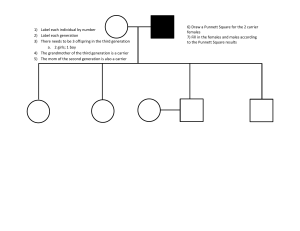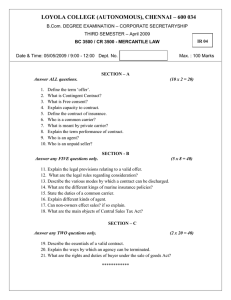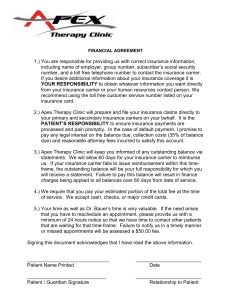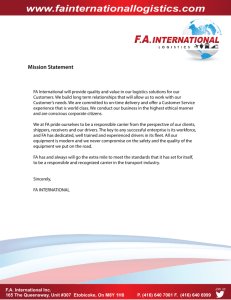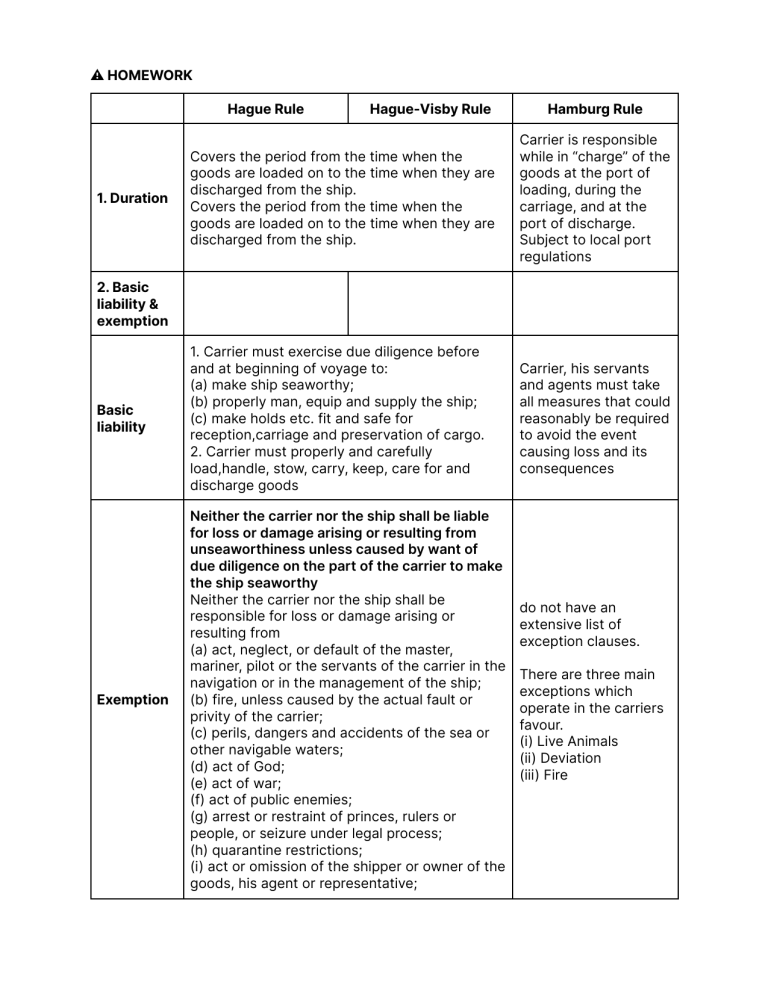
⚠️ HOMEWORK Hague Rule Hague-Visby Rule Hamburg Rule Covers the period from the time when the goods are loaded on to the time when they are discharged from the ship. Covers the period from the time when the goods are loaded on to the time when they are discharged from the ship. Carrier is responsible while in “charge” of the goods at the port of loading, during the carriage, and at the port of discharge. Subject to local port regulations Basic liability 1. Carrier must exercise due diligence before and at beginning of voyage to: (a) make ship seaworthy; (b) properly man, equip and supply the ship; (c) make holds etc. fit and safe for reception,carriage and preservation of cargo. 2. Carrier must properly and carefully load,handle, stow, carry, keep, care for and discharge goods Carrier, his servants and agents must take all measures that could reasonably be required to avoid the event causing loss and its consequences Exemption Neither the carrier nor the ship shall be liable for loss or damage arising or resulting from unseaworthiness unless caused by want of due diligence on the part of the carrier to make the ship seaworthy Neither the carrier nor the ship shall be responsible for loss or damage arising or resulting from (a) act, neglect, or default of the master, mariner, pilot or the servants of the carrier in the navigation or in the management of the ship; (b) fire, unless caused by the actual fault or privity of the carrier; (c) perils, dangers and accidents of the sea or other navigable waters; (d) act of God; (e) act of war; (f) act of public enemies; (g) arrest or restraint of princes, rulers or people, or seizure under legal process; (h) quarantine restrictions; (i) act or omission of the shipper or owner of the goods, his agent or representative; 1. Duration 2. Basic liability & exemption do not have an extensive list of exception clauses. There are three main exceptions which operate in the carriers favour. (i) Live Animals (ii) Deviation (iii) Fire (j) strikes or lock-outs or stoppage or restraint of labour from whatever cause, whether partial or general; (k) riots and civil commotions; (l) saving or attempting to save life or property at sea; (m) wastage in bulk or weight or any other loss or damage arising from inherent defect, quality or vice of the goods; (n) insufficiency of packing; (o) insufficiency or inadequacy of marks; (p) latent defects not discoverable by due diligence; (q) any other cause arising without the actual fault and privity of the carrier, or without the fault or neglect of the agents or servants of the carrier, but the burden of proof shall be on the person claiming the benefit of this exception to show that neither the actual fault or privity of the carrier nor the fault or neglect of the agents or servants of the carrier contributed to the loss or damage. 3. Limitation limited the liability of the carrier to £100 gold value per package or unit. The concept of ‘package or unit’ for limitation of individual items of cargo, but also introduced an alternative formula based on the weight of the cargo. No provisions about goods delayed. 10,000 Poincare Francs per package or unit or 30 Poincare Francs per kilo of the gross weight of damaged or lost goods whichever is higher. Right to limit lost if carrier intends to cause loss or is reckless knowing loss would probably result. 2.5 SDR per kg or 835 SDR per package or shipping unit. 2.5 times freight payable for goods delayed but the recovery may not exceed the total freight payable under the contract of carriage. Carrier will only lose right to limit liability if he intended to cause loss or was reckless knowing such loss would probably result. Deck carriage where expressly prohibited will result in loss of right to limit liability
